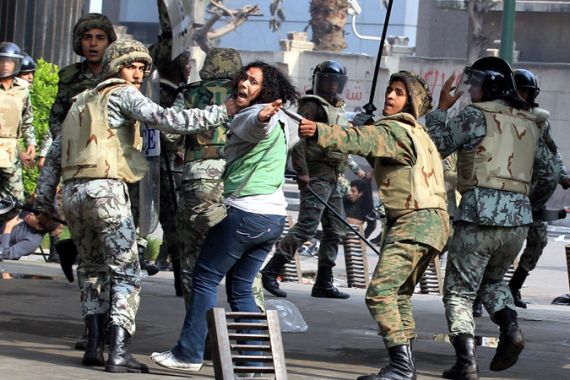
Has Egypt’s revolution been aborted?
As Egypt’s army continues to clash with protesters, we debate the status of the promised transition to civilian rule.
Egypt’s military police have clashed with demonstrators in Cairo in a third day of violence.
|
“What we’re having today is not a revolution; it is an attack against the revolution.” – Kamal el-Ganzouri, Egypt’s prime minister |
It began on Friday when one of several hundred peaceful protesters, staging a sit-in outside the cabinet building, was reportedly detained and beaten by troops.
Since then the violence has left 10 people dead and 432 others injured. It has also emerged that precious national archives were burnt when the Institute of Egypt was set alight.
The violence has overshadowed the first parliamentary elections since President Hosni Mubarak was ousted in February.
|
“This is not the first time, every time the military council said ‘we meant well, forgive us, this is the last time’. But now, it seems that this is their – Emad el-Din Hussein, Editor Al-Shorouk newspaper |
We look at what all of this means for Egypt’s increasingly troubled transition in the wake of the revolution that brought the end of Mubarak’s rule almost a year ago.
Is the army losing credibility as Egyptians await the promised switch from military to civilian rule? Are Egyptians becoming more intolerant of a violent transitional period with no security and a deteriorating economy? And who is to blame?
Inside Story discusses with guests: Ahmed el Nashar, an Egyptian political activist; Abdallah Schleifer, a senior fellow and professor emeritus at the Kamal Adham Center for Journalism at the American University in Cairo; and Gamal Abdel Gawad, a political analyst and senior research fellow at Al-Ahram Center for Political and Strategic Studies.
|
“There’s a polarisation going on and it’s true a lot of people have come to the conclusion that the revolution did not happen or was aborted or it has not been fulfilled and are pressing on. But on the other hand, what has to be considered is with each swelling of a clash, a significant portion of the population gets turned off.” Abdallah Schleifer, professor emeritus at the American University in Cairo |